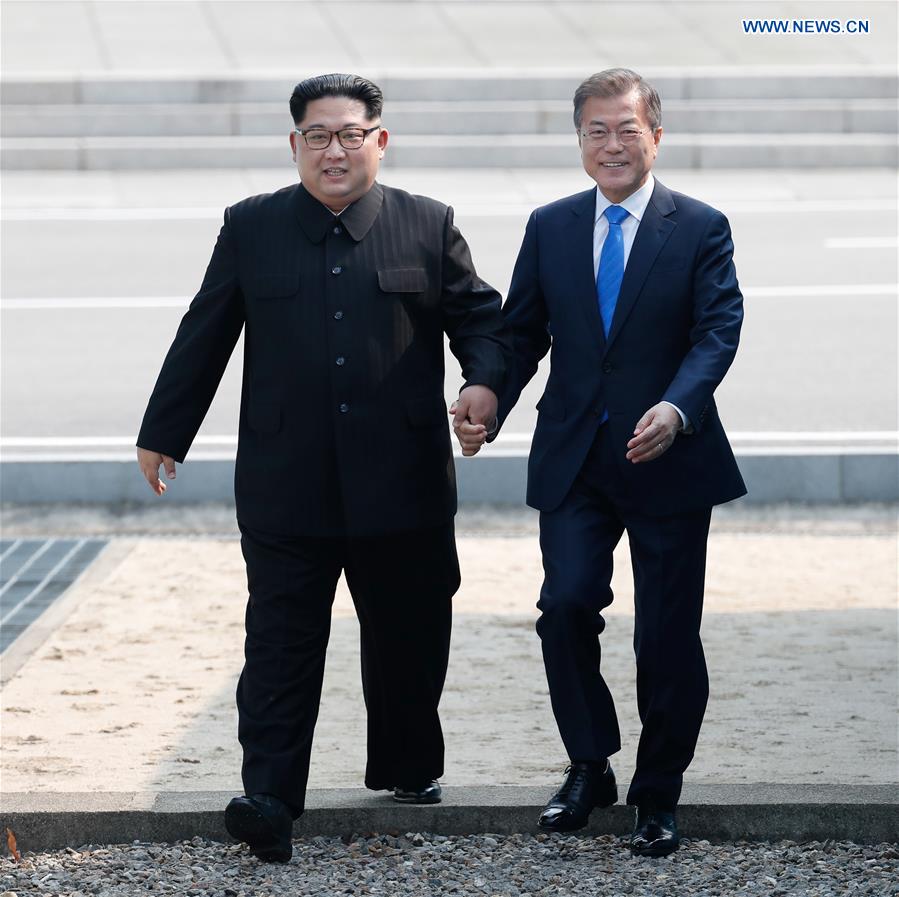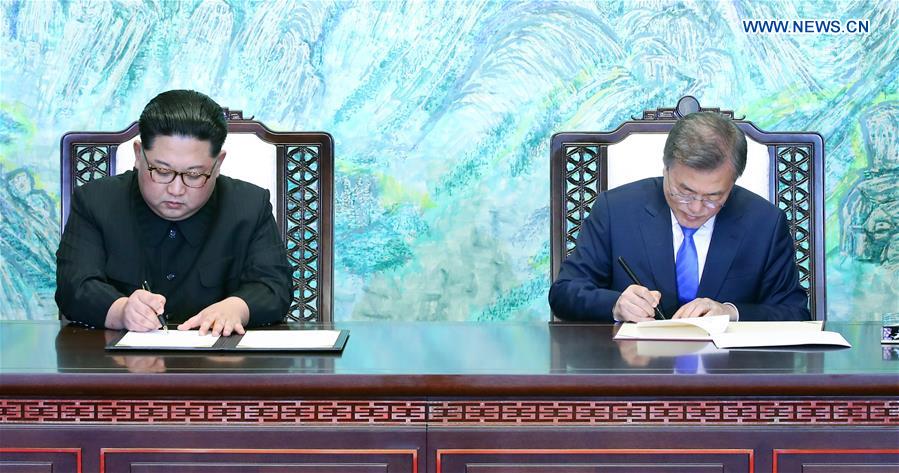Moon-Kim summit rekindles hope of lasting peace on Korean Peninsula

South Korean President Moon Jae-in (R) meets with top leader of the Democratic People's Republic of Korea (DPRK) Kim Jong Un in the border village of Panmunjom on April, 27, 2018.(Xinhua/Inter-Korean Summit Press Corps)
by Xinhua writers Chen Jian, Tai Beiping, Yoo Seung-ki
GOYANG, South Korea, April 27 (Xinhua) -- Top leader of the Democratic People's Republic of Korea (DPRK) Kim Jong Un and South Korean President Moon Jae-in met on Friday at the truce village of Panmunjom for a historic summit.
The summit, 11 years after a previous one, comes after relations between Seoul and Pyongyang took a turn for the better since the start of this year and rekindles hope for a lasting peace on the peninsula.
LANDMARK HANDSHAKE
A beaming Kim was greeted by Moon and shook hands with him right above a concrete slab at Panmunjom, which serves as an inter-Korean border roughly along the 38th parallel dividing the two Koreas.
After walking across the military demarcation line (MDL) into the South Korean side, Kim, in a dark blue suit, invited Moon to briefly cross the border into the DPRK side. The episode aroused applause from people at the scene.
Their hand-shaking marks a historic moment in inter-Korean relations. Kim became the first DPRK leader to step onto South Korean soil since the end of the 1950-1953 Korean War ended in an armistice.
The top-level meeting under a slogan of "Peace, a New Start" is the third summit between the two Koreas after the first and second ones in 2000 and 2007.
After their formal, closed-door talks at the Peace House, on the South Korean side of the border village of Panmunjom, the two leaders pledged to end the Koran War and reaffirmed their commitment to the complete denuclearization of the Korean Peninsula in a joint declaration.
They also agreed to reduce their conventional weapons pending the outcome of their joint efforts to reduce military tensions and promote a lasting peace on the Korean Peninsula.
"A new history begins now -- at the starting point of an era of peace," read the message Kim wrote in a guestbook at the Peace House.
"The moment Kim crossed the military demarcation line for the first time in history has turned Panmunjom from being a symbol of division into one of peace," Moon said before their talks.
"This is a very important meeting, especially as it is now clear that the possibility of a peace treaty, formally ending the Korean War, might be discussed and process to complete it agreed," said professor Hugh White, a strategic studies expert from the Australian National University.
BUD OF LASTING PEACE
The face-to-face summit marks a potential turning point in the long time hostility between the two Koreas in history, and sent the hope of lasting peace on the peninsula.
The leaders confirmed the common goal of making the Korean Peninsula nuclear-free via complete denuclearization in the Panmunjom Declaration for Peace, Prosperity and Unification of the Korean Peninsula.
"The South and the North affirmed their mutual goal of realizing a nuclear-free Korean Peninsula through complete denuclearization," the released statement said.
The leaders also agreed to formally end the Korean War, which will be declared later this year, 65 years after hostilities ceased.
The two Koreas technically remain at war as the 1950-1953 war ended with an armistice, not a peace treaty.
To formally end the Korean War, the two Koreas agreed to push for three-way or four-way talks involving the United States and China to replace the Korean armistice with a peace treaty.
But achieving the goal of denuclearization could be a bumpy journey ahead given the difference between Pyongyang and Washington in defining denuclearization.
The DPRK wants the denuclearization of the Korean Peninsula, while the United States wants the denuclearization of the DPRK.
Denuclearization "largely depends on North Korea (the DPRK) and American relations rather than inter-Korean relations," Leonid Petrov, a Korean Peninsula expert at the Australian National University, told Xinhua before the summit.
According to Park Jie-won, a lawmaker from South Korea's Party for Democracy and Peace, the most important thing in the denuclearization process is building trust between the DPRK and the United States.
To discuss additional measures, the two Koreas will hold general-grade military talks before the end of May.
Further, the leaders agreed to a range of measures aimed at promoting peace and reconciliation between the divided Koreas.
ALL EFFORTS NEEDED
The much-anticipated summit is the culmination of rapprochement between Seoul and Pyongyang. The two leaders agreed to meet again later this year.
In fact, the rapprochement has long been planed and prepared by all sides concerned. The peace opportunity has been snowballing at a rapid pace.
In his New Year's address, top DPRK leader Kim expressed his readiness to send athletes and cheerleaders to the South Korea-hosted Winter Olympics, a peace overture responded to by South Korea with alacrity.
The 2018 Winter Olympics became a peace festival "as we made the Seoul (Summer) Olympics an opportunity to build peace about 30 years ago," South Korean Foreign Minister Kang Kyung-wha has told reporters.
Dan Mahaffee, senior vice president and director of policy at the Center for the Study of the Presidency and Congress in Washington, D.C., told Xinhua that the push around the Olympics by the two top leaders has lowered tensions on the peninsula and led to the dialogue.
The ongoing positive developments are actually in line with China's "dual-track" approach of advancing denuclearization of the Korean Peninsula while establishing a peace mechanism.
Ukeru Magosaki, a former senior official at Japan's Foreign Ministry, said China is likely to persuade the DPRK and the United States to reach consensus. "China could play an important role in creating favorable conditions for Pyongyang and Washington," he said.
Jeong Se-hyun, chairman of the Institute for Peace and Cooperation and a former South Korean unification minister, opined that to sign a peace treaty on the Korean Peninsula, China must not be excluded. "The peace treaty must be signed to achieve the establishment of diplomatic ties between the United States and North Korea (the DPRK)."
"There is light at the end of the tunnel, but it will not be all smooth sailing ahead of us," Chinese State Councilor and Foreign Minister Wang Yi has said, urging relevant parties to promote the peace process step by step and meet each other half way with the precondition of denuclearization.
(Xinhua reporters Geng Xuepeng in Seoul, Wu Qiang in Pyongyang, Yan Lei in Tokyo, Xu Haijing in Canberra and Zhu Dongyang in Washington also contributed to the story.)
Your Comment
Name E-mailRelated News
-
;
-
-

-
Moon, Kim pledge complete denuclearization, signing truce into pea
Moon Jae-in and Kim Jong Un confirmed a common goal of complete denuclearization and agreed to push for multilateral talks to turn the current armistice agreement into a peace treaty.
-
Based in Lhasa, Tibet Vista is a Tibet travel agency that specialized in Tibet permit, and Tibet tours for both private and group travelers at a local price!
•4 Days Lhasa City Group Tour from USD 460 •8 Days Everest Base Camp Group Tour from USD 850 •15 Days Mt.Kailash Group Tour from USD 1780 •2016 Tibet Train Tours from Beijing, Shanghai, Chengdu, Xining,etc










